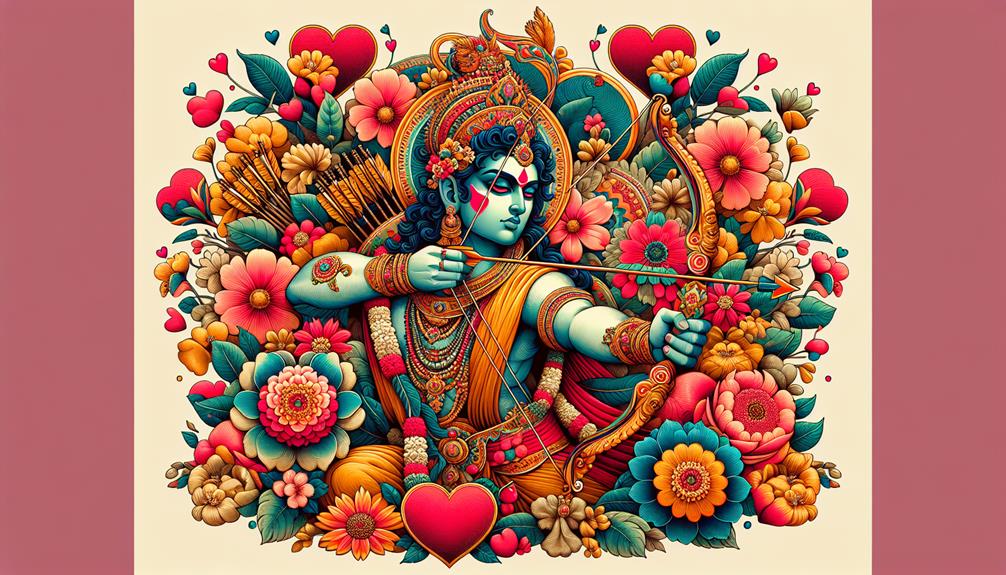Is Kama A Hindu God
Kama, often associated with desire, is a prominent figure in Hindu mythology. However, the question of whether Kama is considered a god in the Hindu pantheon remains a topic of contemplation.
Is Kama A Hindu God
Exploring the origins and significance of Kama in Hindu scriptures sheds light on the complexity of this divine entity. Understanding Kama's role in shaping narratives and influencing deities provides a nuanced perspective on this intriguing aspect of Hindu theology.
Is Kama A Hindu God
Let's unravel the layers of Kama's identity to grasp a deeper understanding of this enigmatic figure in Hinduism.
Is Kama A Hindu God
Key Takeaways
- Kama is a deity of love and desire in Hinduism, embodying passion and unity.
- Kama's origins trace back to Brahma, serving a crucial role in cosmic order.
- Kama symbolizes emotional connections, diversity, and mutual respect.
- Kama influences relationships, creativity, and the enduring power of love in Hindu mythology.
Who Is Kama in Hinduism?
Kama, in Hinduism, is the deity of love and desire. Known as the god of love, Kama is often depicted as a handsome youth wielding a bow and arrows, which represent his ability to pierce the hearts of mortals with the arrows of desire. In Hindu mythology, Kama plays a crucial role in the cosmic cycle by inciting desire among gods and mortals, ensuring the continuation of life and creation. As a symbol of passion and longing, Kama embodies the essence of emotional connection and the pursuit of unity.
Is Kama A Hindu God
Devotees of Kama seek his blessings to experience deep connections with others, foster intimacy, and kindle the flames of love in their lives. By invoking Kama, individuals aspire to cultivate affection, strengthen relationships, and embrace the beauty of human emotions. In Hindu traditions, honoring Kama is a way to celebrate the power of love and desire as fundamental aspects of the human experience, promoting harmony and interconnectedness in the world.
Is Kama A Hindu God
Origins of Kama in Hindu Mythology
In Hindu mythology, the origins of the deity of love and desire trace back to ancient narratives depicting the emergence of a pivotal force shaping the dynamics of relationships and creation. Kama, the god of love, plays a significant role in Hindu cosmology and is intertwined with the creation and preservation of the universe.
Some key aspects regarding the origins of Kama in Hindu mythology include:
- Birth from Brahma: Kama is believed to have been born from the mind of the creator god Brahma, symbolizing the essential nature of desire in the act of creation.
- Marriage to Rati: Kama is often depicted as the husband of Rati, the goddess of love, highlighting the inseparable connection between desire and the pleasures of companionship.
- Role in Creation: Kama's presence is considered essential for the propagation of life and the continuation of the cosmic order.
- Association with Spring: Kama is associated with the season of spring, symbolizing renewal, fertility, and the blossoming of new relationships.
- Depictions in Art and Literature: Kama's stories are frequently depicted in Hindu art, poetry, and scriptures, emphasizing the enduring relevance of love and desire in human existence.
The Significance of Kama
The divine essence of love and desire embodied by Kama holds profound significance in Hindu cosmology, shaping the fundamental aspects of creation and relationships. Kama represents the force of attraction that binds all living beings together, driving the cycle of creation, preservation, and transformation in the universe. In Hindu belief, Kama is not merely about romantic or physical love but encompasses a much broader spectrum of emotions and connections. It symbolizes the interconnectedness of all beings and the universal longing for unity and harmony.
Kama's significance is deeply rooted in the belief that love is a powerful force that motivates individuals to fulfill their responsibilities and obligations towards society and the cosmos. It emphasizes the importance of cultivating relationships based on mutual respect, compassion, and understanding. Through the lens of Kama, Hindus are encouraged to recognize and celebrate the beauty of diversity while striving for unity and interconnectedness with all aspects of existence. Ultimately, Kama serves as a reminder of the intrinsic value of love and desire in fostering a sense of belonging and interconnectedness within the vast tapestry of creation.
Kama: A God in Hindu Pantheon?
With its profound significance in Hindu cosmology and its role in shaping fundamental aspects of creation and relationships, the question arises: Is Kama considered a deity in the Hindu pantheon?
Kama, the God of Love and Desire, is revered in Hindu mythology for his vital role in the creation and sustenance of life. Often depicted as a youthful figure armed with a sugarcane bow and floral arrows, Kama symbolizes the power of attraction and emotional connection. Kama is believed to influence not only romantic love but also familial bonds, friendships, and spiritual devotion.
While not as prominently worshipped as major deities like Vishnu or Shiva, Kama holds a significant place in Hindu rituals and traditions. Devotees often invoke Kama's blessings for harmonious relationships, fertility, and the pursuit of righteous desires, seeking his guidance in matters of the heart and soul.
Kama's Role in Hindu Mythology
Playing a pivotal role in Hindu mythology, Kama embodies the essence of love and desire, influencing various facets of existence. Known as the god of love, Kama is depicted as a handsome youth armed with a bow and floral arrows, symbolizing the power to arouse feelings of affection. In Hindu mythology, Kama's role is multifaceted, from being the force behind romantic relationships to instigating the pursuit of higher spiritual truths.
Kama's presence is not limited to human interactions but extends to the entire cosmos, where his influence is believed to inspire creativity, passion, and the continuation of life.
In Hindu texts, Kama's actions are often intertwined with the unfolding of divine dramas, shaping destinies and influencing the course of events. Despite facing challenges and setbacks, such as his destruction by Lord Shiva's third eye, Kama's significance endures as a symbol of the enduring power of love and desire in the tapestry of Hindu mythology.
Frequently Asked Questions
How Is Kama Depicted in Hindu Art and Imagery?
Kama, in Hindu art and imagery, is often depicted as a youthful figure with a bow and arrows, riding a parrot or a lotus. Symbolizing love, desire, and attraction, Kama is portrayed with gentle and elegant features, exuding a sense of beauty and charm.
His presence in Hindu art serves to convey the essence of passion and emotional connection, contributing to the rich tapestry of symbolism in Hindu mythology and culture.
Are There Any Temples Dedicated Specifically to Kama in India?
There are no known temples dedicated specifically to Kama in India.
While Kama is a significant deity in Hindu mythology and plays a crucial role in various narratives, he is not typically worshiped in standalone temples.
Instead, Kama is often honored indirectly through prayers and offerings in temples dedicated to other major deities.
This absence of dedicated temples reflects the nuanced ways in which Kama is venerated within the Hindu pantheon.
What Are Some Common Rituals or Prayers Associated With Kama in Hinduism?
Rituals and prayers associated with Kama in Hinduism often focus on invoking feelings of love, desire, and passion. Devotees may offer flowers, incense, and sweets to Kama during specific ceremonies or perform meditative practices to connect with the deity on a spiritual level.
Chanting mantras like 'Om Kleem Kamadevaya Namaha' is a common way to seek Kama's blessings for enhancing relationships and fostering emotional connections.
Are There Any Festivals or Celebrations Dedicated to Kama in Hindu Culture?
Festivals and celebrations dedicated to Kama in Hindu culture are limited. However, some Hindu communities may celebrate the festival of Holi, which has roots in celebrating love and fertility, themes associated with Kama.
Holi is a vibrant festival marked by the throwing of colored powders and water, symbolizing the triumph of good over evil and the arrival of spring. It is a joyous occasion that brings people together in a spirit of unity and merriment.
How Does Kama's Story and Role in Hindu Mythology Differ From Other Hindu Gods and Goddesses?
In Hindu mythology, Kama's story and role offer a unique perspective compared to other gods and goddesses.
Kama, the god of love and desire, plays a crucial role in shaping human emotions and relationships.
Unlike some deities known for power or wisdom, Kama's influence delves into the intricate fabric of human connections, highlighting the significance of love and desire in the Hindu belief system.
This distinct focus sets Kama apart in the pantheon of Hindu gods.
Conclusion
In conclusion, Kama is a significant deity in Hindu mythology, known for his role in representing desire, love, and attraction.
While not considered a major god in the Hindu pantheon, Kama plays a crucial role in the stories and teachings of Hinduism.
His origins can be traced back to ancient texts and scriptures, showcasing his importance in the cultural and spiritual beliefs of followers.

